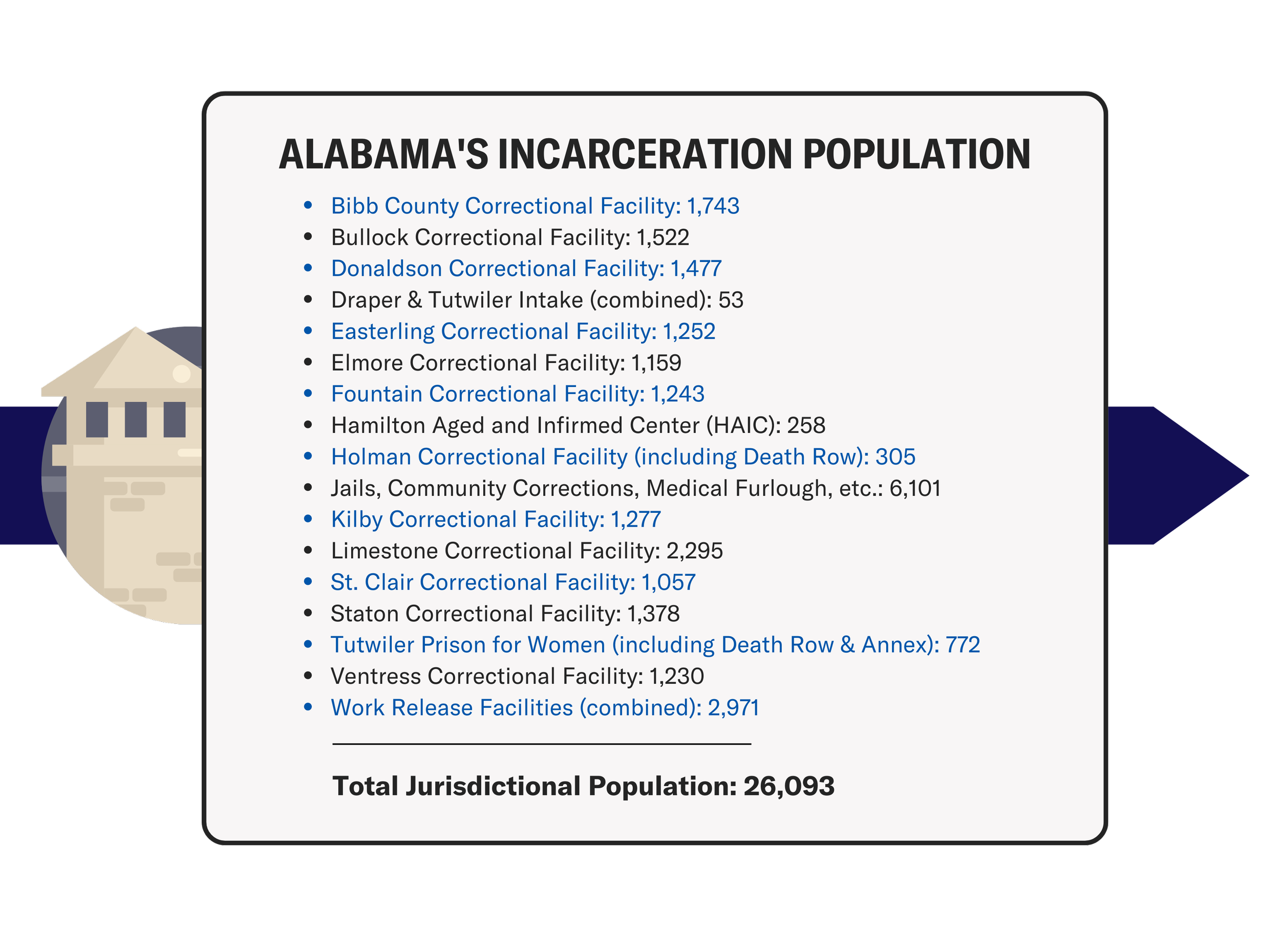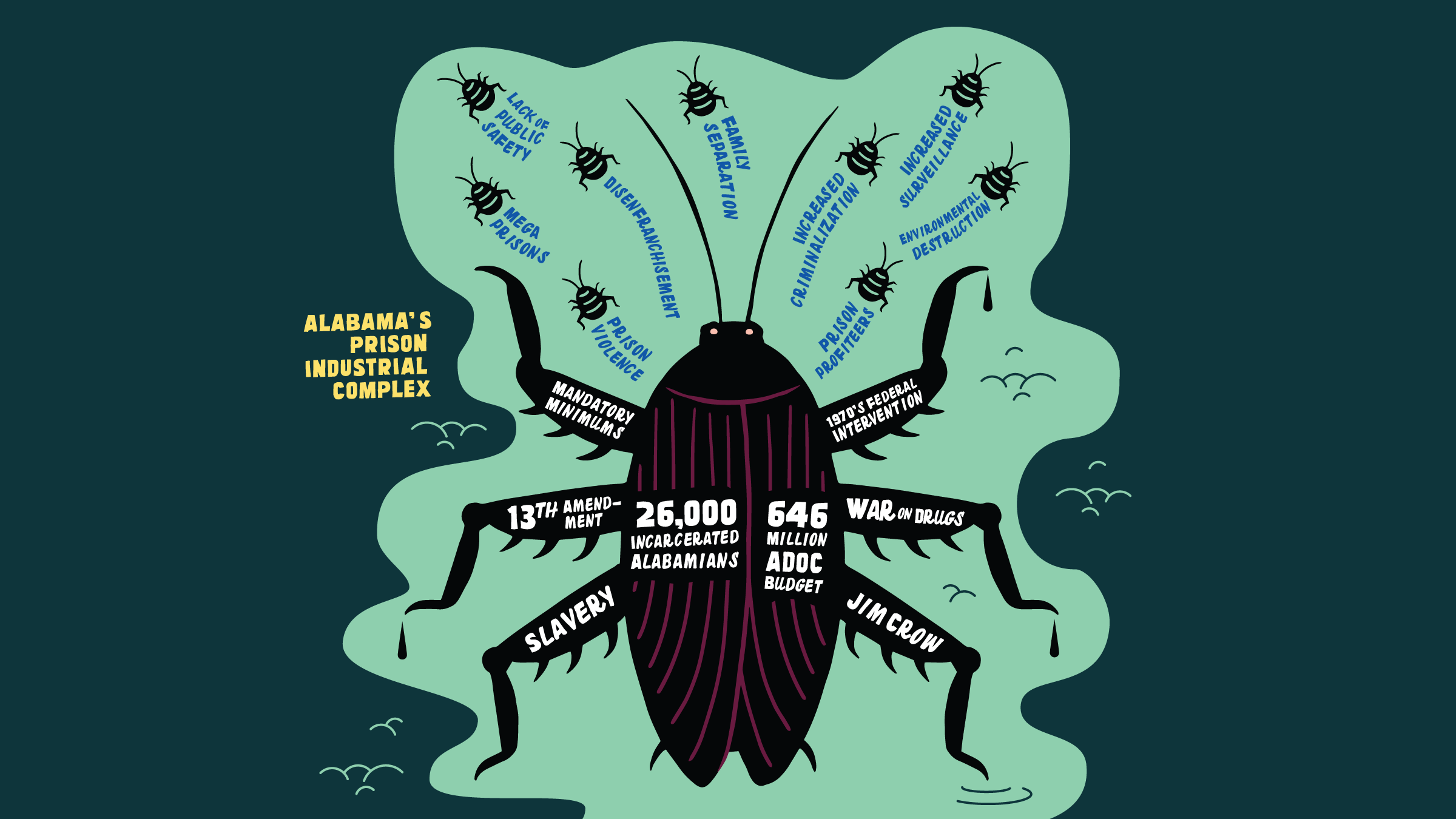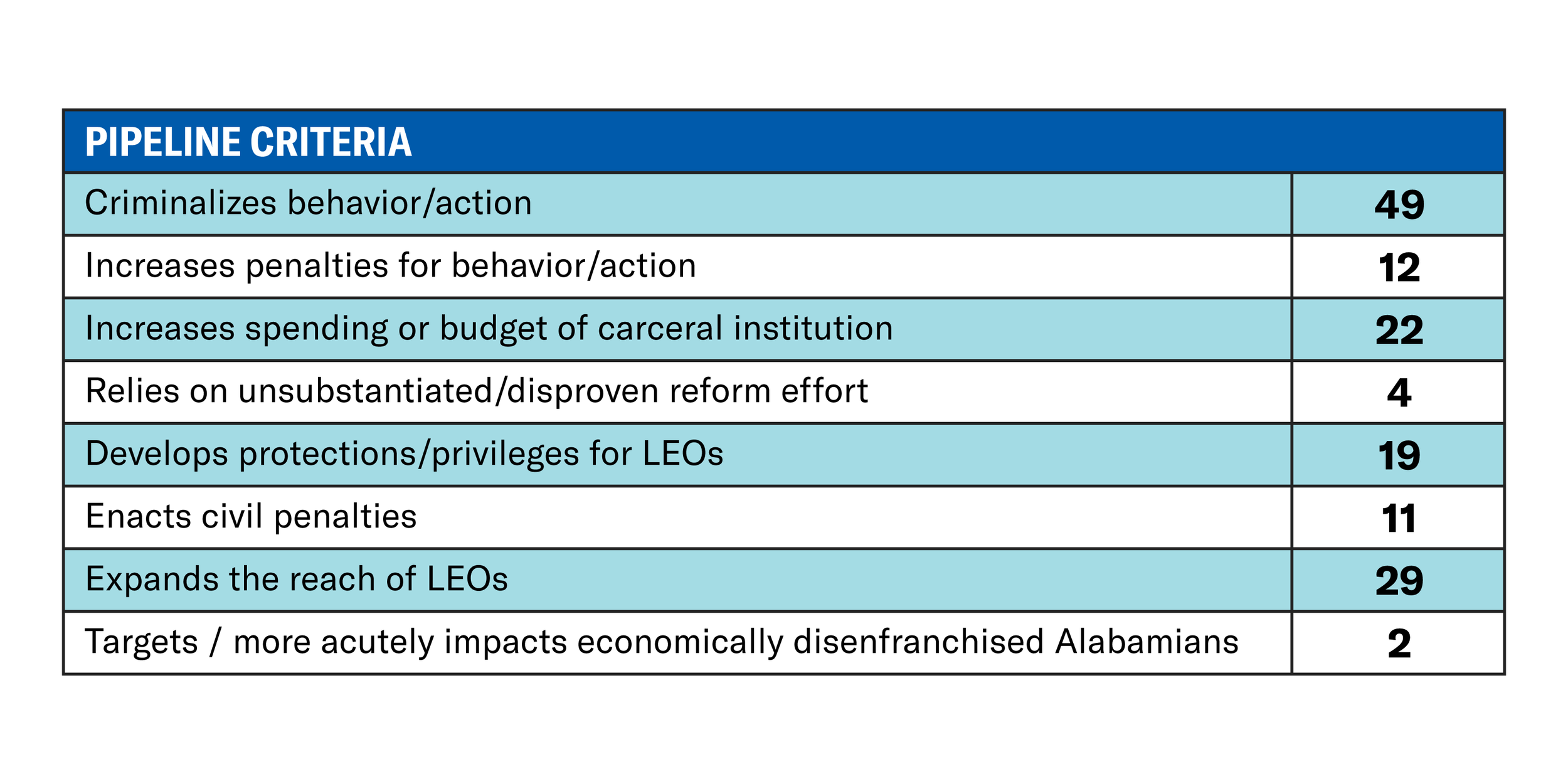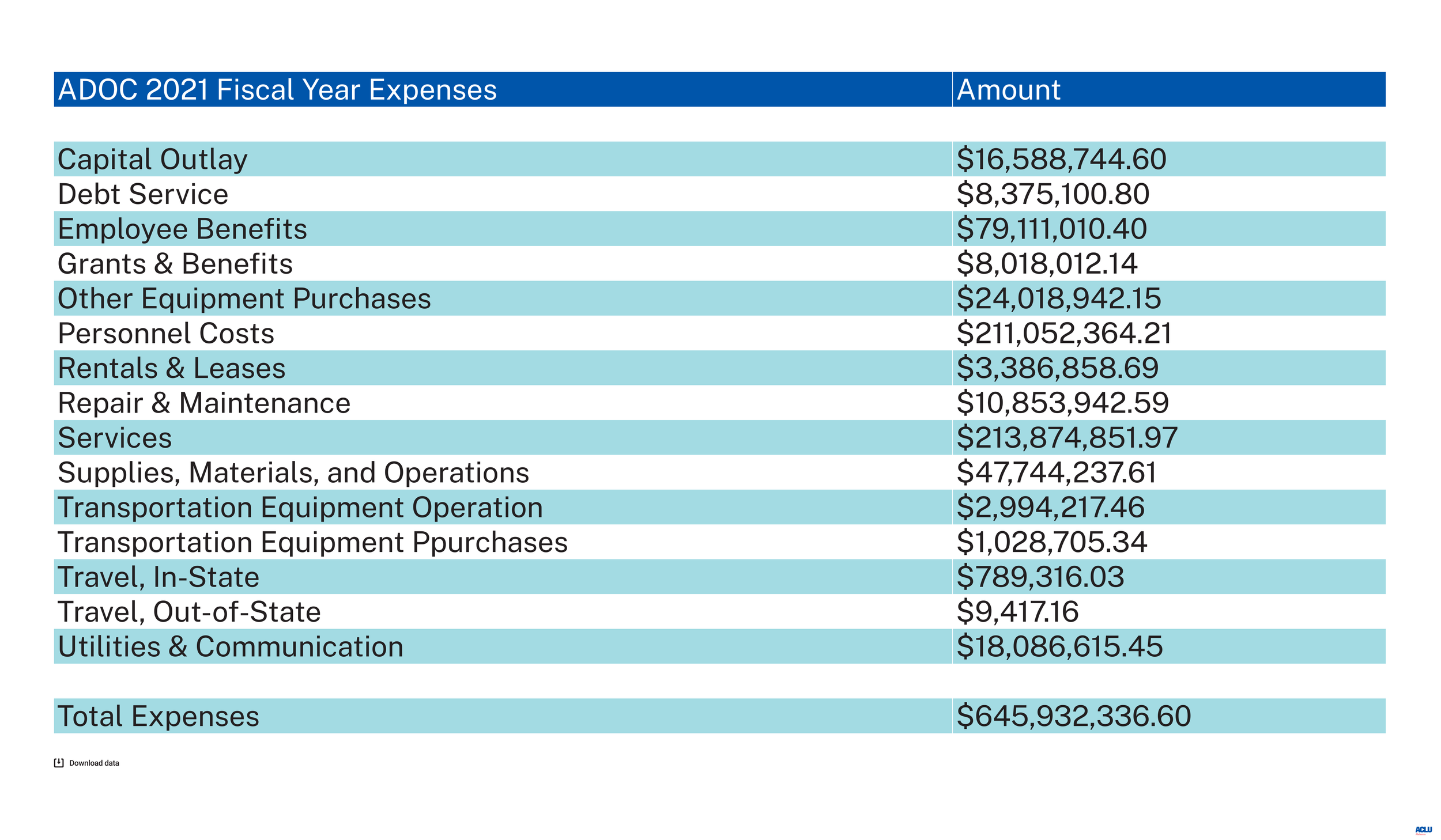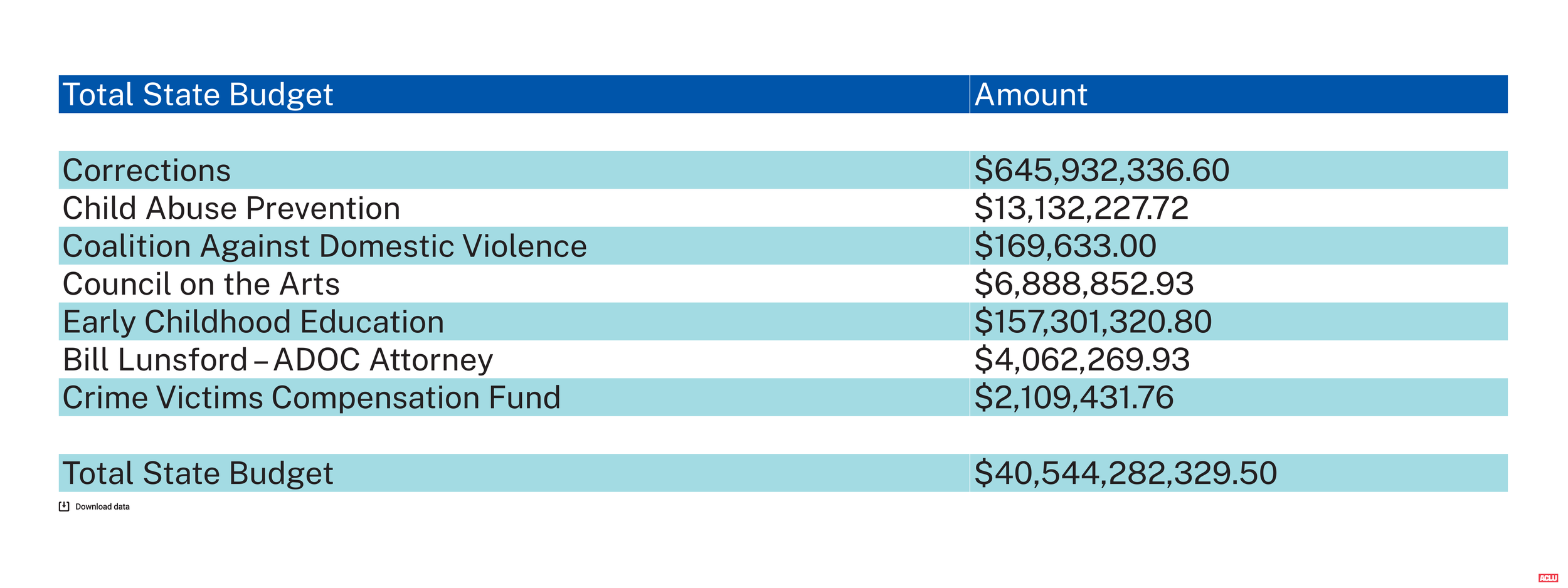2022 Statehouse-To-Prison Pipeline
Overcoming the Alabama Legislature's Dangerous Carceral Focus
Click here to view and download a printable PDF version of this report.
INTRODUCTION
The ACLU of Alabama published the first Statehouse-to-Prison Pipeline report last year in the aftermath of the 2021 Legislative Session where legislators failed to pass meaningful criminal justice reforms or adequately address the Alabama prison crisis.
Building upon the 2021 report, this year’s report demonstrates how the Alabama Legislature’s continued investment in the carceral state has dire consequences for all Alabamians.
Through legislation that criminalizes the procurement of healthcare and the ongoing attack on voting accessibility, the Alabama Legislature continues to expand the scale, scope, and power of carceral policies to the demise of everyday Alabamians' safety, health, and well-being.
prison industrial complex
The prison industrial complex (PIC) is a term describing the overlapping interests of government and industry that use surveillance, policing, and imprisonment as solutions to economic, social, and political problems.
The 2021 report highlighted positive bills that could improve the quality of life for all Alabamians. While this year’s report will touch on some positive bills, the 2022 report will go further by demonstrating how pipeline bills — including the transgender healthcare ban — can ensnare Alabamians into the criminal punishment system.
In determining what constitutes a pipeline bill, this year’s report relies on the definition of the Prison Industrial Complex (PIC) from the organization Critical Resistance. Similar to Dr. Ruby C. Tapia’s definition of the carceral state, first introduced in last year’s report, the PIC is a term that most accurately explains the Alabama Legislature’s reliance on surveillance, policing, and incarceration to inadequately address real social needs.
From these understandings, our Policy & Advocacy team developed the following reflection questions to determine which bills qualify as pipeline bills.
What makes a legislative bill a pipeline one?
⨀ Does this bill criminalize a behavior or action?
⨀ Does this bill increase penalties for a behavior or action?
⨀ Does this bill increase spending or the budget of a carceral institution?
⨀ Does this bill rely on an unsubstantiated or disproven reform effort?
⨀ Does this bill develop unique protections or special privileges for law enforcement officers (LEOs)?
⨀ Does this bill target or more acutely impact economically insecure Alabamians?
Given the acute attacks on marginalized or historically disenfranchised Alabamians, the final part of our Statehouse-to-Prison Pipeline report lays forth a vision for a state that respects, honors, and uplifts the rights of all Alabamians.
PIPELINE REALITY
AT A GLANCE: 2022 LEGISLATIVE SESSION
Start Date: January 11, 2022
End Date: April 7, 2022
PIPELINE BILLS
Trans Healthcare Ban (HB 266/SB 184)
Lead Sponsor(s): Sen. Shay Shelnutt (R-Trussville), Rep. Wes Allen (R-Troy)
House Bill 266 and Senate Bill 184 are companion bills that would criminalize providing gender-affirming healthcare to transgender youth, require school personnel to out trans children to their parents or guardians, and strip away parents’ or guardians' rights to make decisions, under guidance from trained medical professionals, for the best interest of their children.
With the passage of this bill, signed into law by Gov. Ivey, Alabama became the third state to pass restrictions on trans health care, following Arkansas and Tennessee, but the first to add felony penalties. The bill establishes providing gender-affirming treatment as a Class C felony, punishable by up to 10 years in prison.
Today, parents and caregivers of trans youth and their physicians providing gender-affirming care, face a reality where they could be prosecuted under a vague and overly broad law that seeks to erase the reality that trans youth and their families that support them are here in Alabama and call this place their home. The legislation relied heavily on the same model bill language used to ban abortion access in states across the country, including Alabama’s Human Life Protection Act (2019).
In May 2021, leaders of the American Legislative Exchange Council (ALEC), an influential network of conservative policy leaders, state legislators, and corporate lobbyists that draft policies targeting civil liberties, “boasted” about their efforts to restrict the rights to healthcare for trans youth and reproductive rights, according to the Center for Media and Democracy (CMD). ALEC also works routinely in coalition with groups such as Alliance Defending Freedom and Family Research Council, both identified as extremist groups according to Southern Poverty Law Center (SPLC).
According to a 2019 report from USA Today, “Copies of models were introduced nationwide more than 10,000 times in an eight-year span” and “amounting to perhaps the largest unreported special-interest campaign in American politics.”
The bill was passed by the Senate and House over partisan lines. It has been challenged by civil rights groups and portions of the law criminalizing physicians for providing non-surgical medical care were temporarily blocked by a federal judge in June.
Anti-Protest Bill (HB 2/SB 3)
Lead Sponsor(s): Rep. Allen Treadaway (R-Birmingham), Sen. Shay Shelnutt (R-Trussville)
House Bill 2 and Senate Bill 3 are companion bills that would impose harsh criminal penalties on people exercising their first amendment right to protest.
The legislation defines “riot” as “the assemblage of five or more persons in conduct which creates an immediate danger of property or injury to persons.” It states: “A person commits the crime of riot if, with five or more other persons, he wrongfully engages in tumultuous and violent conduct and thereby intentionally or recklessly causes or creates a grave risk of public terror or alarm after receiving an order to disperse by a law enforcement officer or when in violation of a curfew.”
Both “riot” and “inciting a riot” carry a penalty of a class A misdemeanor. Additionally, these bills would allow for warrantless arrests and impose 24-hour holding periods in jail for those accused and significant restitution costs. They would also prevent counties and municipalities from allocating funding away from local law enforcement. These companion bills are a punitive response to Summer 2020’s protests of police violence. They provide broad discretion to law enforcement to determine once a protest action is considered a “riot”.
Across the state, we saw Alabamians exercise their First Amendment rights and despite the violent responses from police, including the Huntsville Police Department’s aggressive use of force against peaceful protestors and Birmingham Police Department’s attacks on reporters, Alabama legislators were quick to file bills that would further infringe upon Alabamians right to protest.
Historically, these attempts to suppress free speech and assembly are not new, especially on the heels of racial justice uprisings, all across the South as noted by 18 organizations, including the ACLU of Alabama, who penned a letter in February 2022 calling on state legislators to oppose the bill.
These bills are designed to penalize those protestors. State Representative Chris England (D-Tuscaloosa) posed a question during a debate on the bill: “What’s the difference between a riot and legitimate political discourse? It seems to me the difference is who’s participating in it.”
While State Representative Allen Treadaway (R-Birmingham)’s bill passed through the Alabama House with a vote of 75-27, it did not receive a vote from the Senate Judiciary Committee once it was sent to the other chamber.
State Representative Allen Treadaway (R-Birmingham)
Representative Treadaway sponsored 53 bills within the 2021 Alabama Legislative Session. Of these 53 bills, nearly 50% of the bills filed were focused on increased criminalization of everyday Alabamians while proposing benefits for Alabama law enforcement.
Rep. Treadaway was also a sponsor of the transgender healthcare ban (House Bill 266). He is the former assistant police chief of the Birmingham Police Department.
Voting Suppression Bill (HB 194)
Lead Sponsor(s): Rep. Wes Allen (R-Troy)
House Bill 194 would make it a class B misdemeanor, which carries a sentence of up to six months and fines of up to $3,000, for local voter education organizations to provide funds for programming or collaborating with their local election offices on any type of outreach.
This could include nonprofit organizations providing trainings on the Voting Rights Act for probate judges, churches partnering with the city or county election officials on "Get Out The Vote" efforts, or fraternities and sororities working with local election officials to get people to the polls on Election Day.
A range of nonpartisan grassroots advocacy organizations, student campus organizations, and voting rights advocates spoke out in opposition of the bill reminding legislators that these groups and others often work in collaboration with local probate judges and election officials to fill gaps due to lack of resources for voter education and voter registration.
The ACLU of Alabama joined with our partners in the Alabama Voting Rights Coalition (AVRC) to oppose this legislation, with Executive Director JaTaune Bosby Gilchrist stating at an AVRC press conference, “Bills like this perpetuate issues of white supremacy and discrimination.”
The legislation went on to be passed by the Alabama House and Alabama Senate along partisan lines and took effect in July 2022.
State Representative Wes Allen (R-Troy)
State Representative Wes Allen’s first term in the Alabama Legislature has been notable for his attempts to criminalize gender-affirming care and prevent access to the ballot box.
Rep. Allen, who secured his party’s nomination for Secretary of State this year in the primary, touted in his campaign ads his efforts to ban curbside voting, an option largely utilized by voters with disabilities, and prevent no-excuse absentee voting in Alabama.
Twenty-seven states and Washington, D.C., offer "no-excuse" absentee voting, which means that any voter can request and cast an absentee/mail ballot, no excuse or reason necessary, according to the National Conference for State Legislatures.
"There is a long list of common sense things the people of Alabama deserve.
To name a few: Medicaid expansion, completed road renovation projects, access to safe and quality education for their children, groceries that are not taxed, humane responses to substance addiction, energy systems that lower consumer prices and carbon footprint, and Internet access that helps us participate more consistently in their own democratic institutions.
Despite this list of urgent priorities, here we are once again, criminalizing behavior with overly broad laws in an attempt to make it harder for our neighbors to vote. Please, neighbors, let's tell our representatives that we deserve wiser stewardship of our time and money."
— Evan Milligan, Executive Director of Alabama Forward
Nick Risner Act (HB 143)
Lead Sponsor(s): Rep. Phillip Pettus (R-Greenhill)
Alabama’s “good time” law was codified in 1980 and states those incarcerated individuals “whose record of conduct shows that he or she has faithfully observed the rules for a period of time...may be entitled to earn a deduction from the term of his or her sentence.” (§ 14-9-41). Such laws vary by state, however, they’re designed to offer credit for positive behavior and participation in educational and/or rehabilitative programming and jobs.
Alabama’s 1980 law barred anyone convicted of a Class A felony or anyone convicted of a sentence longer than 15 years from eligibility, in addition to people convicted of a sex offense. House Bill 143 expands the categories of those ineligible which means people will stay incarcerated in Alabama longer, underscoring our overreliance on incarceration versus meaningful rehabilitation.
Rep. Charlotte Meadows (R-Montgomery) voted against the bill. She argued during the Alabama House debate on the bill that leaves currently incarcerated people who are working toward release on good time without hope, since it would apply to all new and current offenders if signed into law. Criminal justice reform advocates have made similar arguments given Alabama’s draconian sentencing laws and historically low parole grant rates. The bill was passed by the Alabama Senate, 28-0, and the Alabama House, 99-1, and signed by Governor Ivey.
AT A GLANCE: ALABAMA DEPARTMENT OF CORRECTIONS (ADOC) FISCAL YEAR '21 BUDGET
In last year’s Alabama Statehouse to Prison Pipeline report, we shared that the Alabama Department of Corrections (ADOC) was allocated $584,805,971 for Fiscal Year 2021.
Upon conclusion of the 2021 fiscal year, ADOC reported an additional $100 million dollars in funding bringing the total cost of corrections allocations to $650,165,570. ADOC funding comes primarily from the state’s General Fund but they also received funding from work release fees, drug conviction fees, and the COVID-19 relief fund.
Excerpt from ADOC Annual Report, 2021
“Increased production costs combined with decreased numbers of inmate labor and the reduction in productive hours has caused a very sharp decrease in revenues for Alabama Correctional Industries (ACI) from the past year. ACI will continue to come up with innovative ways to train our workforce and meet the needs of our customer base. During FY 2021 however, ACI felt the full force of the COVID-19 virus.”
The Alabama Department of Corrections (ADOC) currently receives more than double the investment that Alabama children receive in early childhood education. Additionally, Alabama legislators recently expended $400 million dollars of COVID-19 relief funds to begin the construction of new mega-prisons. Despite these exorbitant state budget decisions, few state leaders have offered proposals that actually address why Alabama has one of the highest incarceration rates in the world.
Incarceration costs taxpayers and according to the 2022 Public Affairs Research Council of Alabama (PARCA) Public Opinion Survey, Alabamians rank education as the most important state government activity. 73% of Alabamians say too little is being spent on education while 68% say too little is being spent on healthcare. The Alabama Legislature's investments in incarceration do not reflect the priorities of Alabamians.
TIMELINE OF ALABAMA'S PRISON SYSTEM
PROGRESSIVE BILLS
Parole Accountability Bill (HB 57/SB 217)
Lead Sponsor(s): Rep. Chris England (D-Tuscaloosa)
This bill would create a Criminal Justice Policy Development Council to review and assess the current guidelines and practices of the Alabama parole board, as well as adopt new guidelines as necessary. House Bill 57 / Senate Bill 215 allows the policy development council to:
1. Update the inmate classification system for implementation by the Department of Corrections
2. Create and adopt parole guidelines to be implemented by the Board of Pardons and Paroles
3. Allow legislators to adopt a validated risk and needs assessment that has been created and validated for the Alabama felony offender population to be implemented by the Department of Corrections and the Board of Pardons and Paroles.
We support this bill because we know that Alabama’s Board of Pardons and Paroles needs oversight to address historically low parole grants.
Per the Alabama Bureau of Pardons and Paroles (ABPP) 2021 Annual Report, only 15.3% of paroles (648 of 4232) and 27.2% of pardons (353 of 1297) were granted despite many of the denied applicants having met the eligibility criteria of the release guidelines. The largest drop in releases is happening at minimum-security prisons.
This is particularly troubling given that the primary purpose of the Alabama Department of Corrections (ADOC)'s work centers and work releases are to “assist selected inmates in preparing for release and to aid in making the transition from a structured institutional environment back to the community,” according to ADOC’s administrative regulations.
Alabama Board of Pardons and Paroles
Since 2017, Alabama’s three-member parole board, chaired by former prosecutor Leigh Gwathney, has seen a precipitous decline in parole and pardon grants, according to the ABPP statistical reports. Smart Justice Investigative Reporter, Beth Shelburne, has reported on this trend, pointing to the disparities by race and an almost categorical denial of violent offenders as a pattern and practice of the board.
Andrew Skier, a Montgomery attorney who has represented clients before the Pardons and Paroles Board since the late 1990s, said he has seen ebbs and flows in the board’s decision-making but that recent months fall outside the norm. Skier told the ACLU of Alabama, “We’re used to the pendulum swinging back and forth within a certain range, but I’ve never seen anything like this. It’s like we’re redlining in one direction. I don’t understand the purpose in denying these people."
Parole denials are at 89% and pardon denials are at 47% to date, according to the latest available ABPP data (May 2022).
“Every day we are told that our prisons are overcrowded and unsafe. We are told that the state must spend hundreds of millions of taxpayer dollars to build larger facilities. I believe that Representative England's approach to ending the prison crisis is better. I pray that he reintroduces his bill next year and that his colleagues give it their full attention.”
- Diane Files, mother of David Files, who is currently incarcerated in Alabama’s Frank Lee Community Based Facility and Community Work Center
Repeal of the Habitual Felony Offender Act (HB 56)
Lead Sponsor(s): Rep. Chris England (D-Tuscaloosa)
This bill would repeal Alabama's Habitual Felony Offender Act (HFOA), Alabama’s “three-strikes” law, which has been a driver of Alabama’s over-incarceration problem and has been used to disparately sentence Black defendants to life without parole sentences.
Despite new sentencing guidelines that the Alabama Legislature adopted in 2013, Alabama legislators left HFOA on the books for prosecutors to use at their discretion. This adds to sentencing disparities and creates a “trial tax,” in which individuals who don't accept plea deals may face a longer sentence. HFOA has essentially been weaponized to pressure people to plead guilty. We support this bill because it would create a pathway to resentencing for defendants sentenced under HFOA and is one tool for the Alabama Legislature to use to address Alabama’s overcrowded prisons.
Restoring Voting Rights (SB 6)
Lead Sponsor(s): Sen. Linda Coleman-Madison (D-Birmingham)
This bill would eliminate an existing application requirement and instead require the Alabama Bureau of Pardons and Paroles (ABPP) to determine if an individual — who lost their right to vote due to a state or federal conviction and has since been pardoned or released from incarceration, probation, or parole — may receive a Certificate of Eligibility to Register to Vote (CERV).
It would also allow an individual to have their voting rights restored if they are in compliance with either an approved payment plan for the payment of fines, court costs, and fees, or an approved community service plan either in conjunction with a payment plan or in lieu of a payment plan for the payment of fines, court costs, and fees.
We support this legislation because we believe every citizen deserves their full rights to be represented in our democracy and withholding this right to vote should not be a lifelong punishment when you have completed your sentence. This disenfranchisement disproportionately impacts people of color and is a policy rooted in this nation’s history of white supremacy.
The Brennan Center reports Black Americans of voting age are more than four times as likely to lose their voting rights than the rest of the adult population. In addition, the Brennan Center reports restoring rights boosts public safety and helps people who have been incarcerated re-enter society.
This bill passed the Alabama Senate 33-0 and was passed by the House Judiciary Committee, however, it did not get a vote from the full House chamber before the session concluded.
CONCLUSION
Alabama's 2022 Legislative Session reflected state legislators’ commitment to the Statehouse-to-Prison pipeline.
While Alabamians have direly needed the Alabama Legislature to act on Medicaid expansion, infrastructure development and renovation, access to resourced public education, and investment in mental health services and substance abuse treatment options, Alabama legislators instead prioritized limiting voter access, allocating taxpayer dollars to prison expansion, and attacking transgender youth and inclusive learning environments.
In the face of legislative neglect, everyday Alabamians have been forced to fill in the gaps caused by harmful legislation and legislators’ inaction.
For example, because food insecurity and poverty increased under the persistence of the pandemic, Cell A65 provided free food and warming supplies at Linn Park in Birmingham. After the United States Supreme Court’s decision in Dobbs ended abortion access in Alabama, the P.O.W.E.R. House in Montgomery provided free emergency contraception, pregnancy tests, and condoms through its Pro-Choice Assistance Program.
As we reflect on the 2022 Legislative Session and prepare for what lies ahead in 2023, the ACLU of Alabama remains committed to advocating for a budget and legislation that promotes a more equitable and just Alabama. Rather than funneling more taxpayer dollars into a broken Department of Corrections, the Alabama Legislature should respond to the prison crisis by passing parole reform and repealing the Habitual Felony Offender Act (HFOA).
We hope you will join us in our continued fight to disrupt Alabama’s Statehouse-to-Prison pipeline. To get involved and stay up to date with the ACLU of Alabama’s work during the 2023 Legislative Session, please visit aclualabama.org.
ACKNOWLEDGEMENTS
The ACLU of Alabama's Policy & Advocacy staff and Communications staff are responsible for the contents of this report — which was researched, authored, and designed by Dillon Nettles, Stef Bernal-Martinez, Jasmine Peeples, and Monica Riley.
The report concept and design was inspired by the work of our colleagues at the ACLU of Ohio. Our report's illustration on the Prison Industrial Complex was created by E Henderson. We would like to also give special thanks to Dr. Ruby C. Tapia and Critical Resistance.
Click here to view and download a printable PDF version of this report.


